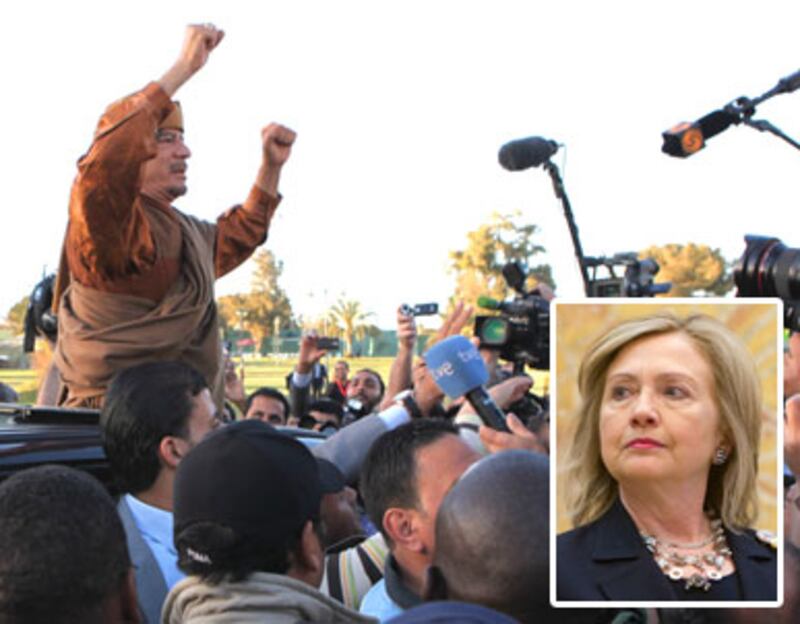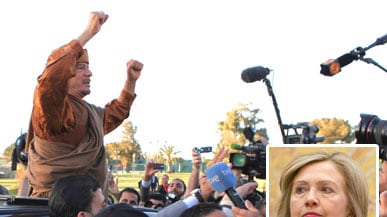Here's what America's worst enemies like Iran and North Korea are spouting on the international circuit about Libya: If the vaunted and mighty NATO and the U.S. can't humble that weirdo Col. Gaddafi and his pint-size army, "what do we have to worry about?" To be sure, NATO and the U.S. haven't hit Gaddafi with all they have for fear of killing civilians. But they have hit him hard and on the open desert—presumably ideal terrain to show off the West's devastating air power, as opposed to the muck-like guerrilla war in Afghanistan. And while the West's enemies know well NATO's self-imposed restrictions on air attacks, they assume that NATO and the U.S. would put such limitations on themselves no matter where they fought. Thus, to Tehran and Pyongyang, the lesson of Libya is that the West can't do decisive harm to them.
NATO leaders are well aware that their credibility and power are on the line. That's what drove President Barack Obama, British Prime Minister David Cameron, and French President Nicolas Sarkozy on Thursday to say: "[S]o long as Gaddafi is in power, NATO must maintain its operations so that civilians remain protected and the pressure on the regime builds." In other words, they still intend to get rid of the Q-ball. Yet, they also recognize that their hands are tied by the U.N. mandate, which in their own words is "to protect civilians… not to remove Gaddafi by force."

Western leaders fully appreciate the box they're in, and often ask their staffs to examine if and how they can do more to incite rebellion in Gaddafi's ranks. Have no doubt, however, that though NATO's use of force is limited, it is significant and sustained. Over the past four weeks, NATO has conducted over 3,600 sorties, more than 1,600 of them strike sorties. These strikes, averaging nearly 60 per day, have destroyed about one-third of Gaddafi's ground armor, as well as most of his fixed air-defense sites and aircraft. They've also seriously depleted Gaddafi's communication capabilities, a big part of military operations. Nonetheless, given strictures on killing civilians, NATO pilots patrolling above Tripoli last week could only watch as Gaddafi toured its streets in an open-top car. Also in recent days, NATO hasn't been able to protect rebels in Misrata, because Gaddafi's troops now use civilian vehicles and other civilian cover.
What to do? One course being pushed by Britain and France is to further escalate air attacks and other military operations. A second course being worked out in the Obama administration is to hold the military line and focus on a cease-fire, as well as other diplomatic, and economic pressures to make Gaddafi vanish. Neither option is terribly promising, but the allies know they must soon adopt a clearer course of action for many reasons, including muting the scorn from Tehran and Pyongyang.
On the escalation option, it is inconceivable that the West will do the one thing that would really injure Gaddafi—remove most restrictions on air attacks that might injure civilians. Plain and simple, the West is not going to start killing Muslim civilians. The likely and much lesser alternative is for the U.S. to deploy special ground attack aircraft (the AC-10 and AC-130) supposedly capable of striking tanks and armored vehicles without killing nearby civilians. Last Thursday, NATO commander Adm. James Stavridis publicly asked for eight of these precision-attack aircraft. Note that this has been his only known request since NATO took control of operations two weeks ago, a sign the NATO chief doesn't want to go for the full military monty.
To Tehran and Pyongyang, the lesson of Libya is that the West can't do decisive harm to them.
Thus, the option of significantly escalating air attacks doesn't look at all likely. More likely on the military front: The West and Arab states will step up their secret deliveries of arms to the rebels, along with a bigger supply of "covert" trainers. Even this kind of arms aid will be limited, because Western leaders remain uncertain and uneasy about who many of the rebels really are—specifically whether they contain a large component of al Qaeda people. In sum, the military option offers only a long-shot hope of eliminating Gaddafi, and thus little relief for the West's credibility problem.
Neither does the cease-fire alternative offer much hope for what ails the West: namely, Gaddafi's early departure. The African Union recently tabled such a proposal, and NATO leaders have demurred for fear of sending a message of weakness to Gaddafi. But some National Security Council and State Department officials are trying, correctly, to forge a strategy including a cease-fire. It contains these elements: a strengthened truce to include a pullback of Gaddafi forces to bases, allowing humanitarian aid, etc.; better organizing of the rebels politically, providing arms to checked-out rebels, boycotting Libyan oil, continuing to freeze Gaddafi assets, and attempting covert deals with Gaddafi supporters to overthrow him. Gaddafi probably will reject a toughened cease-fire because it makes it easier for the West to build up the rebels. But it's worth trying anyway. At least it dims the spotlight on inconclusive air attacks and might split Gaddafi from his African friends.
All of which is to say that barring a stroke of luck, the West is up the creek without a paddle—and can't stop paddling. There are no promising solutions. Best under such circumstances to maintain military operations at about current levels rather than do more and still fail. Best to let Paris and London complain about NATO (read the U.S.) not doing enough and leave the brunt of the fighting to them. After all, they were the prime advocates of military intervention.
Most certainly, NATO can feel good about saving innocent Libyan lives. But it is very hard to have a good feeling about how and when NATO's humanitarian intervention will end. And as time passes inconclusively in Libya, it becomes harder still to convince Iran and North Korea that NATO is not a paper tiger.
Leslie H. Gelb, a former New York Times columnist and senior government official, is author of Power Rules: How Common Sense Can Rescue American Foreign Policy (HarperCollins 2009), a book that shows how to think about and use power in the 21st century. He is president emeritus of the Council on Foreign Relations.






